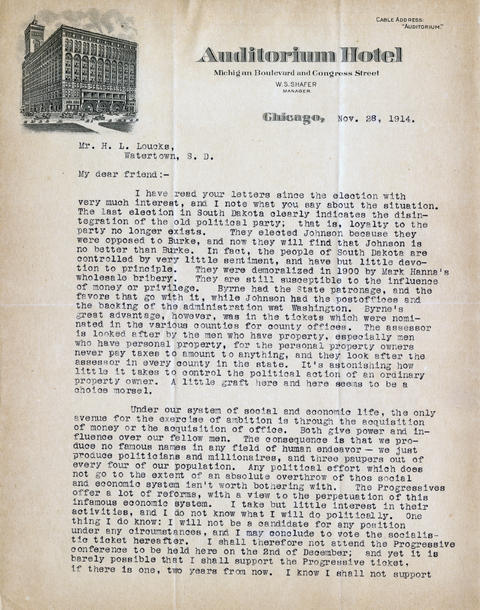Identity elements
Reference code
Name and location of repository
Level of description
Title
Date(s)
- 1914 November 28 (Creation)
Extent
2 pages
Name of creator
Name of creator
Content and structure elements
Scope and content
R.F. Pettigrew writes to H.L. Loucks concerning the current state of the nation and state politically. Pettigrew discusses his dislike for President Wilson and the current administration. Pettigrew also mentions the money expenditure used to pay for tax pamphlets and being printed in newspapers. Finally, Pettigrew begins partnership with Loucks for the coming months.
System of arrangement
Conditions of access and use elements
Conditions governing access
Physical access
Technical access
Conditions governing reproduction
Languages of the material
Scripts of the material
Language and script notes
Finding aids
Uploaded finding aid
Acquisition and appraisal elements
Custodial history
Immediate source of acquisition
Appraisal, destruction and scheduling information
Accruals
Related materials elements
Existence and location of originals
Existence and location of copies
Related archival materials
Related descriptions
Notes element
General note
TRANSCRIPT
Cable Address:
“Auditorium.”
Auditorium Hotel
Michigan Boulevard and Congress Street
W. S. Shafer
Manager.
Chicago, Nov. 28, 1914.Mr. H. L. Loucks,
Watertown, S. D.My dear friend:-
I have read your letters since the election with very much interest, and I note what you say about the situation. The last election in South Dakota clearly indicates the disintegration of the old political party; that is, loyalty to the party no longer exists. They elected Johnson because they were opposed to Burke, and now they will find that Johnson is no better than Burke. In fact, the people of South Dakota are controlled by very little sentiment, and have but little devotion to principle. They were demoralized in 1900 by Mark Hanna’s wholesale bribery. They are still susceptible to the influence of money or privilege. Byrne had the State patronage, and the favors that go with it, while Johnson had the post offices and the backing of the administration wat Washington. Byrne’s great advantage, however, was in the tickets which were nominated in the various counties for county offices. The assessor is looked after by the men who have property, especially men who have personal property, for the personal property owners never pay taxes to amount to anything, and they look after the assessor in every county in the state. It’s astonishing how little it takes to control the political action of an ordinary property owner. A little graft here and here seems to be a choice morsel.
Under our system of social and economic life, the only avenue for the exercise of ambition is through the acquisition of money or the acquisition of office. Both give power and influence over our fellow men. The consequence is that we produce no famous names in any field of human endeavor – we just produce politicians and millionaires, and three paupers out of every four of our population. Any political effort which does not go to the extent of an absolute overthrow of thos social and economic system isn’t worth bothering with. The Progressives offer a lot of reforms, with a view to the perpetuation of this infamous economic system. I take but little interest in their activities, and I do not know what I will do politically. One thing I do know: I will not be a candidate for any position under any circumstances, and I may conclude to vote the socialistic ticket hereafter. I shall therefore not attend the Progressive conference to be held here on the 2nd of December; and yet it is barely possible that I shall support the Progressive ticket, if there is one, two years from now. I know I shall not support Mr. Wilson, who I consider the most subservient tool the thieving interests of New York have ever had in the White House. If the “old line” republicans put up Taft or any of the old gang of thieves that ran the Republican party, of course I shall not vote the Republican ticket. Really, I feel like saying what I choose, and publishing what I please, no matter whom it hits, and between times, attend to my own business.
I sent VanMeter $500, and I expended $750 besides in circulating literature and paying for advertisements. I subscribed for “The Public,” a Chicago single-tax weekly, and had it sent to all the bankers, lawyers and doctors of South Dakota. I have also sent them two pamphlets, each on the subject of single tax, and this cost me a little over $300. It looks to me as though we got very little for our effort; you put in a whole year of hard work. Still, perhaps it’s education that will count in the future.
However, I shall be glad to keep in touch with you, and correspond with you, and work with you, for I know that you are right upon all these questions.
I am here in Chicago with Mrs. Pettigrew, who is in the hospital, and don’t know when I shall return. A letter addressed at the Auditorium will reach me.
Yours very truly,
R. F. Pettigrew

